Blackspot on Zephirine Drouhin
I returned from vacation to discover that my one year-old Zephirine Drouhin rose bush, purchased from the Antique Rose Emporium in Independence, Texas, has many yellow leaves covered with round, black spots. A few of the other antique rose bushes also have a few of these leaves, but this one is the worst. I removed the affected leaves--they almost fell off. What is the best way to treat for this? I've tried to use no pesticides, etc., but I am now willing to use whatever it takes. Can't bear to think of a life without roses.
Comments (30)
zeffyrose
16 years agoI have several Zeffys in my yard.
Some get BS and lose some leaves but I find that the regrowth is very quick and quite pretty.
I'm willing to put up with the BS on this rose because I love the early spring bloom with the delightful fragrance.
I have several strong climbers (Viking Queen--and Compassion to name a couple)that don't get BS so I just don't look at Zeffy intil she recovers.
Florence
buford
16 years agoAs pesty as blackspot is, technically it's a disease, not a pest. So pesticides will not help. You need a fungicide. Since you already have blackspot, you need one that will get rid of blackspot. The Bayer Disease Control spray will do that. It will not help the leaves that have already turned yellow and spotty, but it will keep more leaves from doing so.
And you will have to keep spraying every 2-3 weeks until fall.
Related Professionals
Panama City Landscape Architects & Landscape Designers · Fort Worth Landscape Contractors · Kaysville Landscape Contractors · Long Beach Landscape Contractors · Lynn Landscape Contractors · Manhattan Landscape Contractors · Nashua Landscape Contractors · Peachtree City Landscape Contractors · Sammamish Landscape Contractors · Vancouver Landscape Contractors · Vashon Landscape Contractors · West Coon Rapids Landscape Contractors · Wickliffe Landscape Contractors · Gurnee Siding & Exteriors · Southampton Siding & Exteriorskitchendetective
Original Author16 years agoYes, I know it's not a pest; that's why I wrote "pesticides, etc." I was trying to abbreviate the fact that I have tried to avoid using chemicals other than seaweed and water on all my garden, a practice which, obviously, has not been effective against BS. Do you use Bayer on all the surrounding roses, too, or only the ones obviously affected? It seems many people aren't terribly worried about BS. If it's ignored, will it kill the bush?
buford
16 years agoNo, it will not kill the bush. It will just make it look ugly and defoliate at least partly.
I do spray all my roses, but some more than others. I live in a very hot humid area and most of my roses will get blackspot and lose all their leaves.User
16 years agoShe looses half her leaves here most Summers and hses had at least 13 Summers and does fine just not pretty. I've used The Cornell formula and variations, I've used Seaweed spray, I've used fungonil!!!! Fungonil worked best but it's never 100%
jbcarr
16 years agoThis was one of the roses that led to me abandon spraying. Mine is from ARE. I couldn't figure out how to keep ZD free of blackspot. I had the same results with and without spraying. Recognize I may have been doing it wrong, but I thought I was following the directions. What I learned was this rose defoliatated a few times per season, and always grew back its leaves. It blooms heavy in the spring with sporadic rebloom afterwards, and usually a good fall bloom. So in my opinion, it will live without spraying for blackspot, and bloom. Would it do better with a successful spray program? I'll let others speak to that. You can interplant with a vine such as clematis, or mandevilla, so the bare branches are not so noticeable, and you get some color out of it.
michaelg
16 years ago"will it kill the bush?"
It can contribute to winterkill in colder climates by depleting the plant's supply of starches and sugars, or so enfeeble a plant that it can make but little bloom. However, vigorous plants like Zepherine Drouhin can defoliate twice a year and keep growing. This would be true for most large-growing roses that are winter hardy in the location, but not true for hybrid teas that freeze down every year.
Maybe 15 years ago, there was a ZD boomlet, with catalogues and magazine articles claiming she is disease resistant, which is not the case in the East anyway. I planted her in a very conspicuous place where I didn't want a spotty rose, and she made such a huge plant that spraying was burdensome. If you decide not to spray, you might consider moving the plant in winter to an inconspicuous location.
"do you use Bayer on the surrounding plants too?"
Roses vary in their disease resistance, depending on the climate, the variety, and the strains of disease in a particular garden. A susceptible rose doesn't necessarily infect a resistant rose.
"I have tried to avoid using chemicals "
A lot depends on where you live, which you haven't revealed. There are resistant roses for every climate, but in some climates, including mine, there are not a lot of those roses. I plant resistant roses and some not-bad roses that I'm attracted to. The latter I spray with sulfur, which is probably less toxic than baking soda and provides adequate control. I avoid or get rid of the most susceptible roses. Don't trust catalog claims of resistance, but ask here in reference to your location.
roseleaf
16 years agoI almost gave up on ZD after I got her due to blackspot because I donÂt spray. But as the rose matures, that becomes less of a concern. In the spring and fall, the rose is fully foliaged all the way to the ground. The pic below was taken after the spring flush, showing the bare legs near the ground, and this is normal for her to spend the humid summer here. SheÂs on western exposure and gets sunlight from noon on, and is quite busy growing new shoots and setting buds all summer. At the other corners of the sunroom are Renae and Crepuscule which are spotless. Something for you to consider beside ZD, which may suffer more with blackspot in other parts of country.
{{gwi:280450}}
kitchendetective
Original Author16 years agoMy ZD is on a western exposure side and receives sun from about noon until evening. Ironically, I bought that rose because it was billed as hardy in Central Texas, which is famously humid and hot in the summer. Perhaps the Antique Rose Emporium exaggerated the carefree, appropriateness-to-the-climate of this rose. We prepared the soil over a period of six months before planting. I would need to check the names of the neighboring roses as I've forgotten them, but the ZD had lovely, very noteworthy blooms this spring, so she stands out in my mind. She is also afflicted with BS more than her neighbors, though. I do appreciate all the advice. I'm thinking I will apply systemic anti-fungal agent this summer, see how it goes, and decide whether to repeat that next year.
solicitr
16 years ago"Resistance" is not synonymous with "immunity." All but a very few roses are susceptible to infection- the 'resistant' ones are those which don't suffer excessive defoliation or loss of vigor. As you've noted, ZD appears to be a cultivar which defoliates on its own anyway, and so on balance one would expect its health to be less compromised by BS than many others.
patricianat
16 years ago"Hardy in Texas" means it will not be killed by the cold that your zone gets in a normal year.
kitchendetective
Original Author16 years agoThe ARE salesperson specifically told me these would be good for my garden in response to my question about wanting not to spray or treat certain roses in my area.
palisade
16 years agoFlorence mentioned Zephirine Drouhin in another post so I did a search. Can any one tell me if this climnber can grow without regular spray in Maryland? From the picture above if I can get it grow and look like that I wouldnÂt need to spray it. I donÂt want to be on a ladder to spray such a large climber.
Tracyolga_6b
16 years agoIt will have great spring flush then it will defoilate, grow new set of leaves, again defoliate, survive the winter and bloom next year nicely. You can't keep leaves on w/o regular spray. You can plant it together with clematis to cover bare canes when defoliate.
Olgacemeteryrose
16 years agoPer the University of California, pesticides include herbicides, fungicides, insecticides, and miticides. Diseases are pests. Weeds are pests. Bugs can be pests. Rats and other critters are vertebrate pests. That's what UC teaches their master gardeners, and the public.
As to whether you HAVE to spray for black spot or any other pest - depends on your growing conditions, the rose that you're growing, and how much pest damage you're willing to tolerate. ZD was a poster child for EVERY disease in my garden the last two years - BS, powdery mildew, rust - but is pretty good this year. Sacramento usually doesn't have much fungal disease, so my impression is that ZD is more susceptible than many other varieties. Its relative health this year may indicate that it does better with maturity, and it probably liked that I defoliated, cleaned up debris on the ground, and put down fresh mulch in late winter. Growing roses is pretty easy here. You rose growers across the US who contend with serious fungal diseases, Japanese beetles, Rose Rosette Disease, hard freezes and other obstacles have my sincere admiration.
Anitakitchendetective
Original Author16 years agoI used to live in So. Cal. My rose garden was truly carefree; and I had fresh roses all year round. Fancy, showy floribundas. Hybrid teas. I lived in blissful ignorance regarding the potential destroyers of roses. It seemed that anything one planted grew. Now, I live in a place where gardening takes a lot more work (and knowledge).
buford
16 years agoI have a ZD planted last year. It's on the NW corner of my yard and I'm planning on it climbing up my deck. I do spray regularly and it has all it's leaves so far. It still has PM, but many of my roses do this year, most likely due to the dry conditions (no rain to wash the leaves). But I have not noticed any defoliation on the base not due to blackspot.
Last year, when I stopped spraying in fall, it did get bs pretty bad and I also lost 3-4 canes to winter kill, very unusual in my zone (7, maybe 8). So it is a bit tender.
As far as bloom, the spring flush this year was zapped by the Easter freeze. It has bloomed sporadically since then.
stephanotis_1
16 years agoOur issues are non-stop here in Arizona as well. In Spring, everything is beautiful with perfect temps, abundant flowers, and dry conditions. Then suddenly the heat hits, taking temps into the 114's, frying the blooms and the leaves. If you aren't underwatering, you are overwatering, causing iron deficiency. If you don't water as early in the a.m. as possible, like 5:00, you risk sunburn by water on the leaves. If you water too late you risk mildew and blackspot. After 95% of the leaves fall off our burnt roses, the monsoons hit with downpours that will usually flood the area and wash away all of the mulch we have diligently put down to protect the tender roots, and leave behind a myriad of weed seeds in it's place. Also, because of the clay soil we have here, it takes days for the water to drain off, mosquitoes suddenly have a paradise for breeding and biting for the next couple of months. Finally the Fall will come, bringing cooler temps, and also fooling the poor roses into thinking it's Spring again, so out come the bursts of growth in bloom and leafing out. Then it suddenly freezes around Turkey Day, causing the poor things to defoliate once again, and attempt to go dormant, which they are then unmercilessly teased out of during the many times the temps will go from 27 to 80, and back again. And yet we toil on, spraying, watering, deadheading, and babying our roses for those few months a year we get rewarded ten thousand fold in beautiful blooms for our efforts.
sherryocala
16 years agoI bought my bedraggled ZD on Valentine's Day this year. The nursery owner did not remember what is was, and I was a newbie to roses. It had one flower on it, and I fell in love. Searched it out on the net, and, uh-oh, realized this rose though beautiful and lusciously fragrant was not going to be good in my hot, humid Florida Zone 9. A couple of local rosarians told me they don't bloom here. So it's been in the pot with its same four nearly bare canes (except for the yellow leaves) and three flowers weeks apart (that I saw coming but somehow missed seeing). I haven't known what to do with her. Would she prefer less blistering sun? A little shade? How much is too much shade? I read that on a north wall it will do great - in England. Since it suffers so from BS, I had ruled out putting her on the west wall of the house where the dewy mornings last into the afternoon. But wait, in the last week beautiful new foliage has appeared. (Alfalfa tea doesn't work overnight, does it? I mean literally.) Can this be true to form for ZD? Back to location... I have tall slim oak trees on my north property line with about 5 or 6' of bright shade most of the day on the south side of them. Would this be a good spot? I have a similar oak tree with almost no shade on the south side -almost all day sun. I have another spot that faces west with the trees behind it that would get blistering sun from 4PM till dark. Am I wasting my time on a rose that won't bloom here? If so, anyone want a rose with dreams of fragant, cerise flowers?
jbcarr
16 years agoI think Olga has the best description and solution for this rose. Definitely a keeper for the times it is in bloom. As long as it is otherwise healthy and in a good spot, it will come back like the Phoenix from the ashes of blackspot defoliation. Put some vines on it, and you will get all kinds of questions about your unique shrub. Mandevilla vine is another I use, and it gets big in one growing season. I would avoid morning glory.
zeffyrose
16 years agoVery interesting post---Isn't it amazing what some of us will go through just to smell a beautiful rose--
Stephanotis-----you description was amazing---
It also amazes me that wiht all the problems with Zeffy she still shows up in the catalogs----since 1868-----
I've seen some gorgeous pictures of Zeffy-----
I have several but the one that does the best is on the Northwest corner and she is growing in a spot that my DH used to propagate Azaleas and Yews so the soil is fantastic-----
She just seems to be very happy there---at the base her "trunk" is huge------
She has survived through much neglect (on my part) due to surgery etc. but I do love her and I think she knows it-----My DH gave me the name Zeffyrose because he heard me talking to her---LOL LOL
Fo all you newbies----in case you haven't seen this picture---my DH calls this one "find Flo"
{{gwi:211551}}
Florencenami
16 years agoFlorence that is gorgeous. I love the color.
Will ZD do well in Florida - orlando suburbs, zone 9b to be precise. I would love to train it up a column on my front porch but I am concerned that it wouldn't receive enough sun in the morning. That spot receives sun from noon onwards until 8 pm in the summers.
Thanks,
Namielabc
16 years agoI love this rose even though I've never grown or seen it personally. I'm in zone 5a - Wisconsin. Anyone tried it in WI? Also, why not to morning glories with ZD?
catsrose
16 years agoZeffy is married to Black Spot. Like a best friend with a horrid spouse, you just have to put up with it.
jbcarr
16 years agoI did not recommend morning glories only because they will usually spread all over the place. Search GW for "what plants do you wish you never planted". No doubt they will cover the bush well.
winsomegardener
16 years agoCatsrose,
Truer words were never spoken (written in this case) about Zeffy and her hubby!!! She puts on an awesome show for me here on Long Island in early June. I have 2 of them on the south side of my garage and LOVE the multitude of fragrant flowers for that brief period. The rest of the summer, I wait for the inevitable blackspot to rear its ugly head.
I just purchased my first clematis to add in between my 2 Zeffys to see if that will help camouflage their "nudity" after losing leaves to BS from late summer on.
BC
Tina Buell (Z9b)
8 years agoI just bought a Zeffy. I live in zone 9b (Sacramento). Can anyone recommend a BS/PM preventative maintenance program? Also, can anyone recommend which clematis I should plant with her? After reading this post, I am regretting that I purchased her.....
quiltkitty (Mid TN - zone 7a)
8 years agoTina - You shouldn't regret Zeffy. She is the most drop-dead gorgeous rose, with a phenomenal wafting classic rose smell. Bayer Disease Control works very well for blackspot. I used Neem oil as well. My Zeffy would usually blackspot terribly in the spring, drop all her leaves, then bloom so much that you couldn't see the leaves anyway, then put out a fresh batch of leaves that would be fine through the summer and fall. Other than her first couple of years, I never sprayed. When I did spray, I had no problems, and when I didn't, Zeffy was still the most beautiful rose in my yard. Here is a pic from a couple of years ago, no spray. (That pathetic thing in the lower right was a rosemary bush that got killed in an ice storm over the winter.)
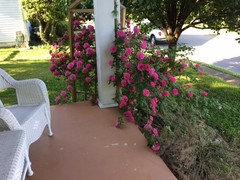
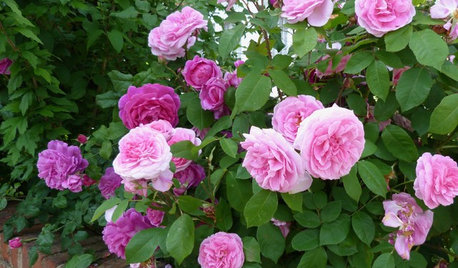
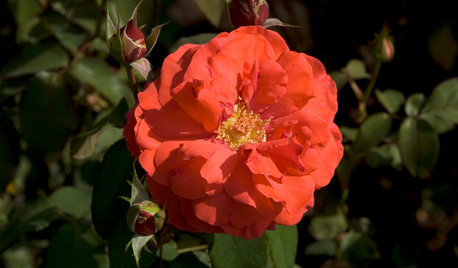
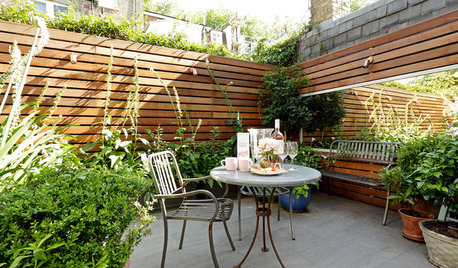
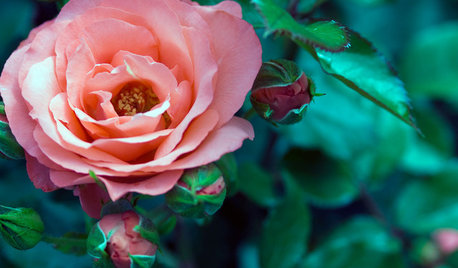
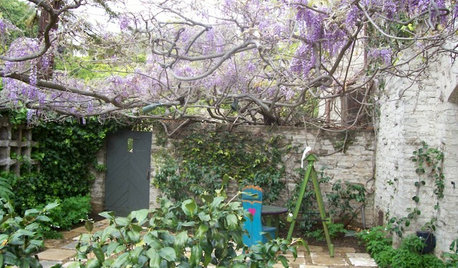








roseman